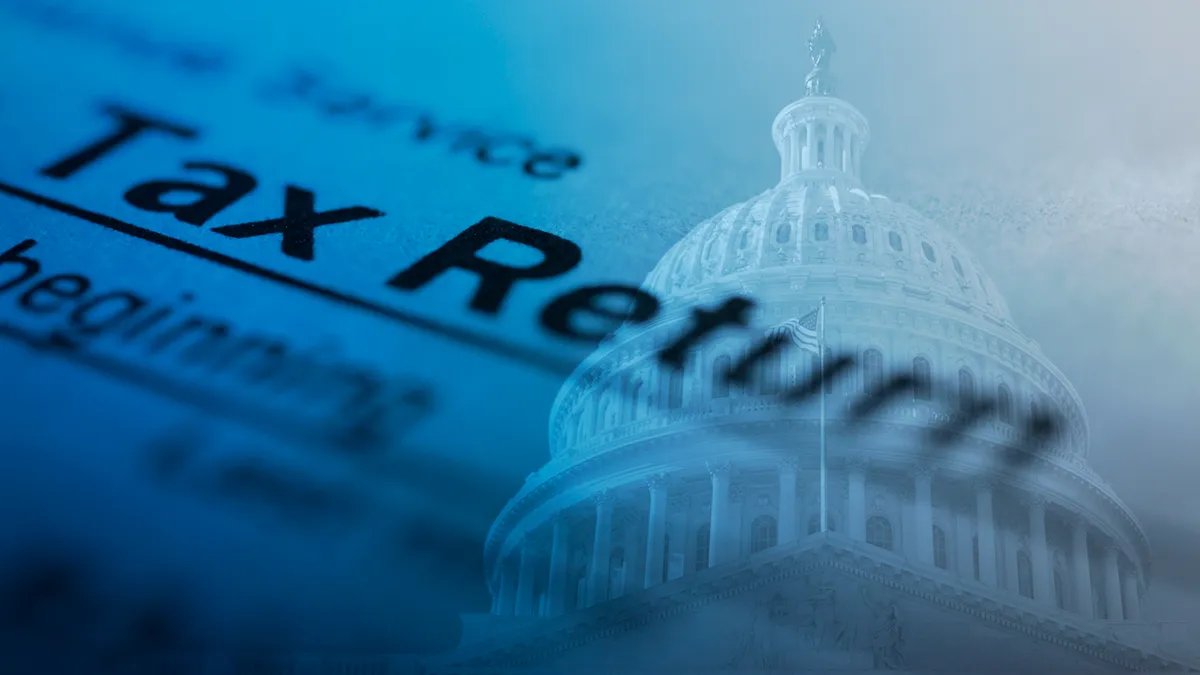Companies should brace for change.
The 30-plus-year drought since the last tax code overhaul may be finally over as Congress sets out to vote on and place a now-finalized tax bill on President Donald Trump's desk.
The bill slashes the corporate tax rate from 35% to 21%, and also includes massive changes to how income earned or kept offshore is treated.
In other words, this week could be monumental for business accounts nationwide. Every industry could see effects — including marketing. Here's a 60-second overview of what the bill could change, and where industry associations stand on it:
MARKETING
IMPACT: A likely flurry of investments in short-term infrastructure upgrades could lay the foundation for the next big leap in digital disruption where powerful online access and sophisticated data-mining become so prevalent that customized, service-driven engagements are possible just about anywhere consumers are.
POSITION: The marketing industry has largely remained silent on the tax bill, in part because the impact won’t be clear until the final version receives approval.
ANALYSIS: The proposed corporate tax cut may be minimized for businesses like Google, Facebook, Amazon and Procter & Gamble — the world’s largest advertiser — as they’ve already taken steps that reduce their effective tax rate in the U.S. Despite this mitigating factor, the tech giants will still see savings as high as $2.28 billion for Google, $1.56 billion for Facebook and $723 million for Amazon, per Cowen senior research analyst John Blackledge. This windfall coupled with a provision that would allow any company to write off capital expenditures — costs that are currently written off over the course of several years — could result in a jump in investment in short-term infrastructure upgrades, as the provision expires after five years. In fact, Blackledge predicts that Google, Facebook and Amazon will spend a combined $234 billion in capital expenditures from 2018 to 2022 because of the expensing provisions in the bill, with Facebook having already announced plans to double its reinvestment next year.
The introduction of a territorial tax system, which the bill includes, means U.S.-based companies with overseas operations would no longer be required to pay U.S. corporate taxes on a portion of or possibly all foreign profits. As a result, some of the infrastructure investments could take place outside the U.S. as these companies look to bolster their international operations. Already, we’ve seen Facebook announce that it’s shifting how it records advertising revenue — by and far its biggest source of revenue — to a local selling structure. While positioned as a move to provide the kind of transparency local governments are demanding about how much revenue local ad sales generate, the move also appears to better position Facebook to increase overseas investments and take advantage of a territorial tax system.
Retailers and telecommunications companies are among those who could take a hit from the bill as many carry a significant amount of debt, and the bill is likely to cap the amount of deductible debt interest at 30% compared to the 100% now allowed. This could undermine an already-fragile brick-and-mortar retail sector.
THE BIGGER PICTURE
The tax reform does not just affect marketing. Here's how the bill may alter other industries.
FOOD AND GROCERY
IMPACT: The tax bill is universally welcomed in the food and grocery industry. The lower tax rate would give companies more money to invest in their businesses or to acquire companies working on clean label, organic or other products consumers demand.
POSITION: Major grocers and food manufacturers support the tax reform bill, and believe the legislation will level the playing field for the industry and retail corporations.
ANALYSIS: The Grocery Manufacturers’ Association, a trade group representing more than 250 food, beverage and consumer product companies, said earlier this month that “tax reform will benefit consumers, workers and manufacturers.” The association urged Congress to move aggressively to finish the legislation and sign it into law.
Independent supermarket operators want to ensure the bill achieves rate parity between major players and pass-through entities, such as partnerships and S corporations. Under the current proposal, the corporate tax rate would be lowered to 21% while the pass-through level would be nearly identical at 20%. In an industry beset with razor-thin margins, tax cuts are particularly helpful for retailers, especially smaller, mom-and-pop establishments.
“Supermarkets are a high tax industry with the majority of independent grocers operating on just one to two percent net profit margins, meaning any reduction in the effective tax rate will significantly help these entrepreneurs hire additional staff, expand offerings, and upgrade their stores," the National Grocers Association said late last month.
The Food Marketing Institute has previously expressed support with the proposed tax changes. Jennifer Hatcher, the trade association’s chief policy officer, said in Novemberthat FMI wants to make sure the final legislation “lowers effective rates, treats all industries and business structures fairly, and helps promote job creation and economic growth.”
Emma Liem / Food Dive
RETAIL
IMPACT: Due to deep cuts for businesses and mild reductions for middle-class consumers, the tax bill would spur economic growth at a time when retailers could really use it.
POSITION: Passing tax reform, with the priority on lowering the corporate tax rate, has been the retail industry's biggest public policy push for years.
ANALYSIS: Passing tax reform, with the priority on lowering the corporate tax rate, has been the retail industry's biggest public policy push for years. Retail trade groups are eagerly heralding the GOP-led House and Senate bills a must-pass measure that, due to deep cuts for businesses and mild reductions for middle-class consumers, would spur economic growth at a time when retailers could really use it.
Despite the differences between the Senate and House bills, the National Retail Federation has been adamant in its stance that "there is far more that the two chambers agree on than they disagree on," from the perspective of retailers, which according to NRF CEO Matthew Shay pay among the highest effective tax rates (although onlookers argue that few pay as high as 35%, currently the effective corporate tax rate). The Retail Industry Leaders Association has also backed the recent GOP-led proposals, which notably exclude the controversial (and now dead) border adjustment tax which retailers fought against earlier this year. The trade association is pushing for "quick" passage of a plan it said will stimulate economic growth and fuel the creation of new jobs.
Retailers also say the tax plan will cut taxes on middle-income consumers, freeing up more money to spend at retail businesses. However, as Morgan Stanley noted in a December report, consumers are spending more on experiences than things, and there's no guarantee any tax savings would go toward retail purchases.
According to a Dec. 4 report from Wolfe Research, the biggest specialty apparel winner under the Senate's tax plan would be Gap, whose corporate tax rate would drop from 39.6% last year to 23.5% once the plan goes into place. Other big winners would include: Nordstrom, Restoration Hardware, Dick's Sporting Goods, Williams-Sonoma and Ulta, which are expected to see their rate drop from the high 30s to between 22.3%-24.2%. Overall, most retailers would be enthusiastic about Congress meeting President Donald Trump's Christmas deadline.
Corinne Ruff / Retail Dive
TECHNOLOGY
IMPACT: Tech companies with large overseas cash holdings will benefit from cuts to corporate tax rates, but SMBs and companies with larger domestic holdings may not be as lucky.
POSITION: Big tech lobbied hard for a cut to the corporate tax rate, but the loss of R&D tax breaks and new income tax applications on grad students may undercut the win.
ANALYSIS: The corporate tax rate currently sits at 35%, but the tech sector on average pays much lower than that. For example, the average tax rate is about 16% for computer services companies and about 25% for internet software companies, according to Aswath Damodaran, professor at the Stern School of Business professor. Moving the overall rate down to 21% may not benefit tech as much as other sectors since the industry already has lower rates.
The lowered, one-time repatriation tax, however, will have a greater effect. Tech tops the list of U.S. companies with the largest overseas cash holdings. More than $564 billion is held abroad between Apple, Microsoft, Cisco, Alphabet and Oracle — $246 billion of which belongs to Apple alone.
The tax levied on overseas cash will drop from the current 35% corporate rate to 15.5% under tax reform. Less liquid assets will be taxed at 8%. For companies without large overseas cash holdings, the benefits are less substantial.
Alex Hickey / CIO Dive




















